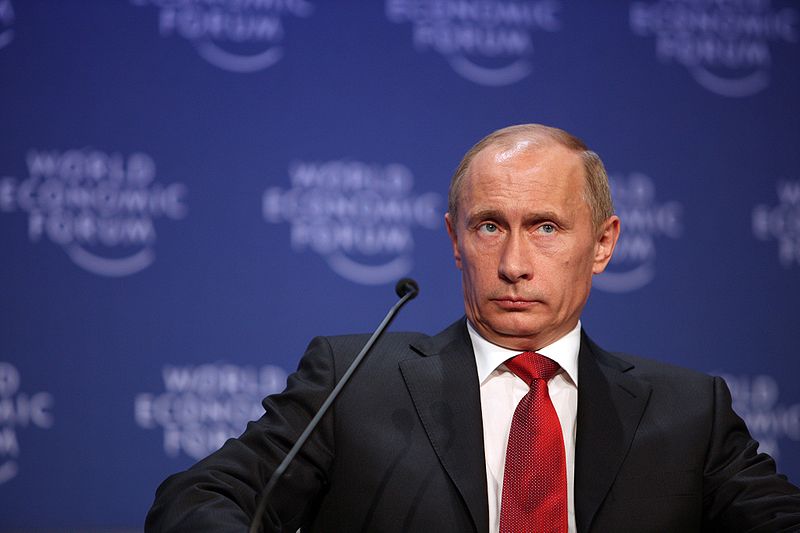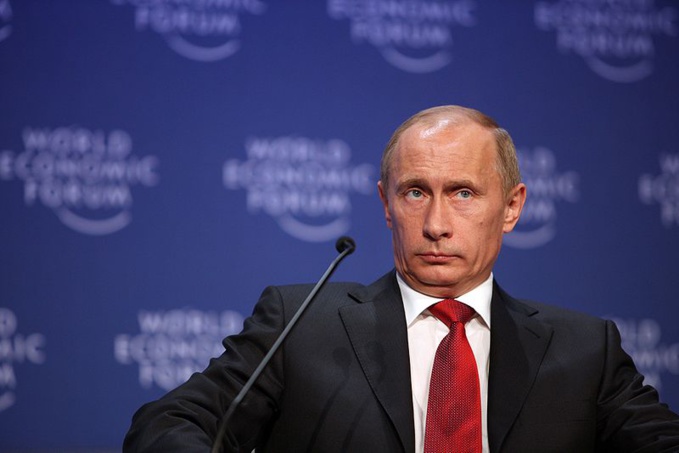Shortly before that, the Russian ambassador in Lebanon threatened that the Russian troops stationed in Syria would avenge an attack on Syria and would attack missile carriers, referring probably to US ships used to accommodate cruise missiles. So, are we on the verge of World War III?
I am stronger than you
Indeed, a few days ago it became clear that Syria's gas attacks against its own population would be followed by retaliation strikes. They would be comparable to those taken a year ago on Trump's orders following Assad’s gas attack on the city of Khan Shaykhun. And that the Russians, like Trump, will do what they know best: show how strong they are.
Moscow is well aware of how sensitive Europe is and that the continent immediately panics as soon as the Russian bear starts saber-rattling. These threats are part of Moscow's policy, they are meant to have an awesome effect and to recall that economically weakened Russia militarily still plays in the big leagues, at least with nuclear weapons. Moscow no longer has the potential for shaping world politics. However, it wants at least to be able to prevent others from some steps. Specifically in this case, Russia hopes to protect its ward Assad from the consequences of Moscow-covered attacks with the use of toxic gases.
In fact, Moscow has already greatly mitigated the threats of its rather insignificant ambassador to Lebanon in a subsequent official statement. It says that Moscow will respond only if an attack on Russian positions and Russian soldiers is committed. This corresponds to last year's status quo, when the Americans tried their best not to endanger Russian troops and even warned them in advance about their actions. And Trump soon lowered the intensity of his warlike tweet and made several conciliatory statements in relation to Moscow.
It is necessary to recall what is actually being talked about: a limited act of punishment for a criminal regime that practices the mass murder of people and demonstratively and continuously violates international military law. In the summer of 2013, the Syrian dictator Bashar Assad crossed the red line, launching a gas attack on the city of Ghouta, which killed hundreds of people. Instead of punishing Assad, then-US President Barack Obama accepted the Russian proposal for mediation. All this ended with the fact that Syria undertook to export all chemical weapons from the country and refused to continue using these weapons of mass destruction.
85 confirmed attacks using chemical warfare agents
Almost a year after the incident in Ghouta, the Obama administration and the EU were enthusiastic about the fact that all chemical weapons had finally been exported from Syria. But in subsequent years it turned out that this was a big lie. Human Rights Watch has since registered at least 85 confirmed attacks with the use of chemical warfare agents, the vast majority of which was undertaken by the Assad government.
Of course, targeted military strikes will not resolve the crisis, and they are simply a low-cost way for Trump to show determination without taking anything more serious. However, his military action a year ago had an effect for a while. Assad did not use chemical weapons almost six months after the attack. But earlier this year the Syrian regime, backed by Moscow, returned to the old practice. So, it's time to give them a clear signal once again.
Russia is bluffing
Europeans, Obama and Trump have been very careful with Moscow in the past years, despite all its aggressive moves. Whatever Russia did, the German Ministry of Foreign Affairs was not tired of making the same proposals for negotiations to the Russians. They had almost no effect. On the contrary, it seems that they further fueled Moscow's vain desire to strengthen its attacks, provocations and threats. Moscow once again returned to the style of the conduct of the Cold War, but at the same time using, as in the case of its propaganda war on the Internet, more modern methods.
source: welt.de
I am stronger than you
Indeed, a few days ago it became clear that Syria's gas attacks against its own population would be followed by retaliation strikes. They would be comparable to those taken a year ago on Trump's orders following Assad’s gas attack on the city of Khan Shaykhun. And that the Russians, like Trump, will do what they know best: show how strong they are.
Moscow is well aware of how sensitive Europe is and that the continent immediately panics as soon as the Russian bear starts saber-rattling. These threats are part of Moscow's policy, they are meant to have an awesome effect and to recall that economically weakened Russia militarily still plays in the big leagues, at least with nuclear weapons. Moscow no longer has the potential for shaping world politics. However, it wants at least to be able to prevent others from some steps. Specifically in this case, Russia hopes to protect its ward Assad from the consequences of Moscow-covered attacks with the use of toxic gases.
In fact, Moscow has already greatly mitigated the threats of its rather insignificant ambassador to Lebanon in a subsequent official statement. It says that Moscow will respond only if an attack on Russian positions and Russian soldiers is committed. This corresponds to last year's status quo, when the Americans tried their best not to endanger Russian troops and even warned them in advance about their actions. And Trump soon lowered the intensity of his warlike tweet and made several conciliatory statements in relation to Moscow.
It is necessary to recall what is actually being talked about: a limited act of punishment for a criminal regime that practices the mass murder of people and demonstratively and continuously violates international military law. In the summer of 2013, the Syrian dictator Bashar Assad crossed the red line, launching a gas attack on the city of Ghouta, which killed hundreds of people. Instead of punishing Assad, then-US President Barack Obama accepted the Russian proposal for mediation. All this ended with the fact that Syria undertook to export all chemical weapons from the country and refused to continue using these weapons of mass destruction.
85 confirmed attacks using chemical warfare agents
Almost a year after the incident in Ghouta, the Obama administration and the EU were enthusiastic about the fact that all chemical weapons had finally been exported from Syria. But in subsequent years it turned out that this was a big lie. Human Rights Watch has since registered at least 85 confirmed attacks with the use of chemical warfare agents, the vast majority of which was undertaken by the Assad government.
Of course, targeted military strikes will not resolve the crisis, and they are simply a low-cost way for Trump to show determination without taking anything more serious. However, his military action a year ago had an effect for a while. Assad did not use chemical weapons almost six months after the attack. But earlier this year the Syrian regime, backed by Moscow, returned to the old practice. So, it's time to give them a clear signal once again.
Russia is bluffing
Europeans, Obama and Trump have been very careful with Moscow in the past years, despite all its aggressive moves. Whatever Russia did, the German Ministry of Foreign Affairs was not tired of making the same proposals for negotiations to the Russians. They had almost no effect. On the contrary, it seems that they further fueled Moscow's vain desire to strengthen its attacks, provocations and threats. Moscow once again returned to the style of the conduct of the Cold War, but at the same time using, as in the case of its propaganda war on the Internet, more modern methods.
source: welt.de



















